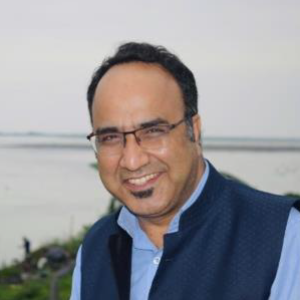Renowned in the field of drug discovery and R&D, Prof Anil Koul is currently Vice President and Head of Global Public Health Discovery & Partnerships, at Johnson and Johnson. He is Adjunct Professor of Translational Discovery at London School of Hygiene and Tropical Medicine (LSHTM), where he has set up a laboratory to focus on TB translational medicine research. As a member of Board of Directors at Janssen Pharmaceutica NV, Belgium, a J&J’s European subsidiary, he holds fiduciary responsibility.
Anil’s key achievement to date has been the discovery and development of Bedaquiline – the first drug to be approved in the last 45 years for the treatment of drug-resistant tuberculosis. Bedaquiline has been conditionally approved in over 64 countries and has reached more than 600,000 TB patients across the world. It is on WHO’s list of ‘essential medicines’ both for adult as well as paediatric TB.
For the discovery and development of Bedaquiline, Anil was awarded by the American Chemical Society its annual ‘Heroes of Chemistry’ award in 2020 and he also received the ‘Sun Pharma Research Award’ in 2017. The J&J team was also presented with the ‘Prix Galien France' Prize for the achievement. Anil has published in leading scientific journals, such as Nature and Science among others, and holds more than 30 international patents.
Between 2017-2019 Anil served as Director of Council of Scientific and Industrial Research (CSIR) - Institute of Microbial Technology, a premier biotechnology laboratory of Ministry of Science and Technology, Government of India. He has also been on Scientific Advisory Board of CSIR. He is currently a core member of UN’s Stop TB Partnership Working Group on New Drugs; and, in 2023, he was listed among the ‘Top 20 Innovators for Bioscience innovations’ in India by BioVoice News.
Anil is passionate about global public health, driving public sector innovations and the translational and build of cost-effective R&D business models for neglected diseases. He has worked across three continents (America, Europe, and Asia) and continues to teach, mentor, advise and give presentations.
Affiliations
Teaching
2023 - LSHTM Teaching AMR to MSc students
2016-2019 - Chair of CSIR-IMTECH, PhD Program
2015 - PhD Jury Member - Anna Haagsma, Vrije University of Amsterdam (VU), The Netherlands
2012-2015 - Visiting Professor at VU, The Netherlands
2012 - Thesis Advisory Committee Member - Fabian Mohr, Institute of Experimental Cancer
2010 PhD Jury Member - Smitha Rao, University of Leuven, Belgium
Research
Drug Discovery - Tuberculosis - Johnson & Johnson Satellite Centre for Global Health Discovery (CGHD)
The Satellite Centre for Global Health Discovery (https://www.lshtm.ac.uk/research/centres-projects-groups/satellite-cent…), based at the London School of Hygiene & Tropical Medicine (LSHTM), aims to develop exploratory biology for new drugs to combat tuberculosis (TB). This deadly disease was responsible for 1.6 million deaths in 2021 and accounts for nearly a third of all AMR-related deaths. The centre aims to support the development of new therapeutics to improve drug treatment options for TB, achieved in part by supporting active drug discovery biology programmes.
Research at the centre is focused on advancing current drug discovery efforts as well as providing a better understanding of the biology surrounding key drug targets in TB. This includes studying the mode of action of new and known drugs in order to improve their effectiveness and reduce the risk of resistance. The centre utilises a matrix of techniques to achieve its goals including transcriptomic, metabolomic and genomic approaches combined with classical in vitro assays.
Current CGHD members:
Professor Anil Koul, Professor of Translational Discovery
Dr Richard Wall, Research Fellow, Molecular Biology
John Dallow, Research Assistant
Shahida Rafique, Research Assistant
Jody Phelan, Assistant Professor
Ellie Davis, Scientific Officer
Tesnim Alattar, Scientific Officer
William Pearson, Research Fellow
Past CGHD members:
Dr Sam Willcocks
Dr Hannah Painter
Anis Hassan
Dr Jana Richter
Cadi Davis
Mariane Bignotto
Suzanne Harris
